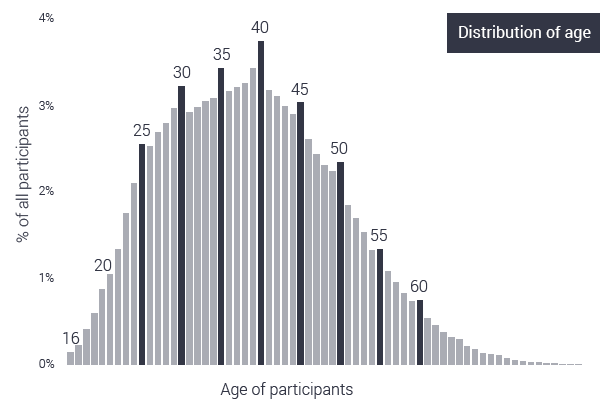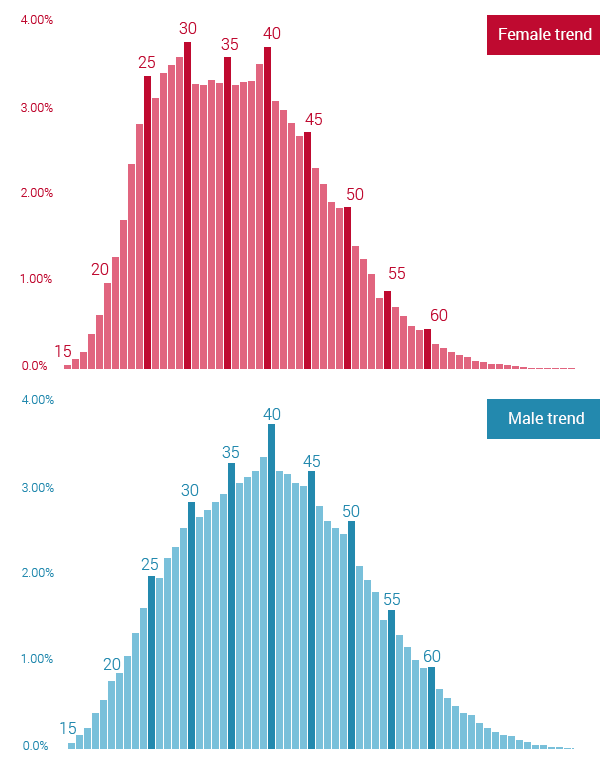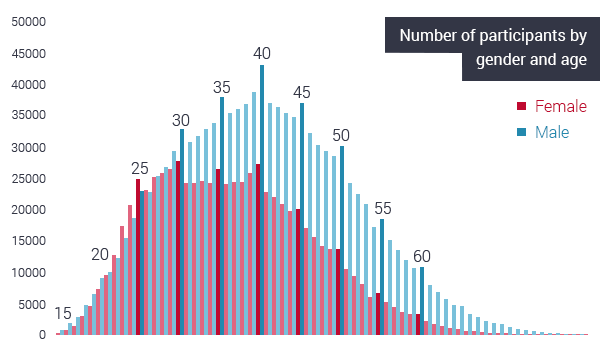Why you are 12% more likely to run a marathon at a milestone age?
New research from RunRepeat.comreveals that people run more marathons when they are at a milestone age.

This conclusion is based on more than 2 million results from around 150 races.
To examine the trend deeper, they have interviewed seven experts from different related fields.
Possible explanations
The probability to run a marathon is 13.34% higher at the beginning of a decade and 10.15% higher when the age ends in 5.
This could be due to:
- The desire to celebrate these times with a significant achievement. Also, the middle of a decade represents the passing of one phase and the teetering towards another decade. (Susan Arruda);
- For a lot of people, milestone ages make them want to achieve – or try- something new as a celebration and also a validation that “Life Is Short. Make It Matter. (Melanie Young);
- We know many people do not run marathons repeatedly, but the thought of completing one is a “bucket list” item and milestone ages and dream goals connect nicely in the minds of some folks. (Jason Fitzgerald and John E. Coumbe-Lilley)
The researchers believe, that people become more contemplative at the end of the period – let’s say at 29 or 34. And start preparing for the new beginning. And as running a marathon is a serious achievement most decide to do it right and train properly. So, most people start their training at the end of the decade or “mid”-decade, but the actual event is marking the beginning of the new stage of their lives.
Mars vs. Venus
Men and women are different – in psychology, physiology, gender roles, societal pressures, priorities, etc. But how much different are they in their participation in marathons?

The graphs show, that for women, the participation peaks at 30, and then it declines. So, it’s left-skewed. Also, women have more pronounced spikes at the milestone ages. Women are 15.1% more likely to run a marathon at the beginning of a decade and 12.3% more likely in the middle of the decade.
Men’s participation peaks at 40 and the distribution is closer to normal. For men, the spikes are smaller. They are 13.5% more likely to run a marathon at the beginning of a decade and 11.3% – in the middle.
There are a number of factors, contributing and explaining this phenomenon:
- Women, on average, become parents earlier than men. And also, still, women take up more of the responsibilities of raising children. And are more likely to have a shift in priorities – from a focus on themselves to a focus on family. (Robert Jackson);
- At 40 men have dips in testosterone and are starting to store fat at an increased rate. Then it becomes clear that they need to start doing something. Why not the most common physical practice in the world? (Dr. John Rusin);
- According to science, the average person’s health starts slowly deteriorating after 30. Women, because of pregnancy and other societal pressures are more aware of this and start taking better care of themselves earlier. Men, usually do this, when they get a sign that something is going wrong.
- Another factor is that women, in general, are less competitive. So, women are less inclined to enter multiple marathons. For most women running one or a couple of them is quite enough. And when other responsibilities come knocking, this is the first to go. (Susan Arruda)
- On average, also, women tend to have more spiritual pursuits, especially after they have children, as Melanie Young observes. So, at a point, they start diluting their focus from pure physical achievement

This opinion is backed up by our data. As we can see, men and women finish marathons in equal numbers by the age of 27 – 28. Then the numbers of male participants greatly overshadow the numbers of women.
